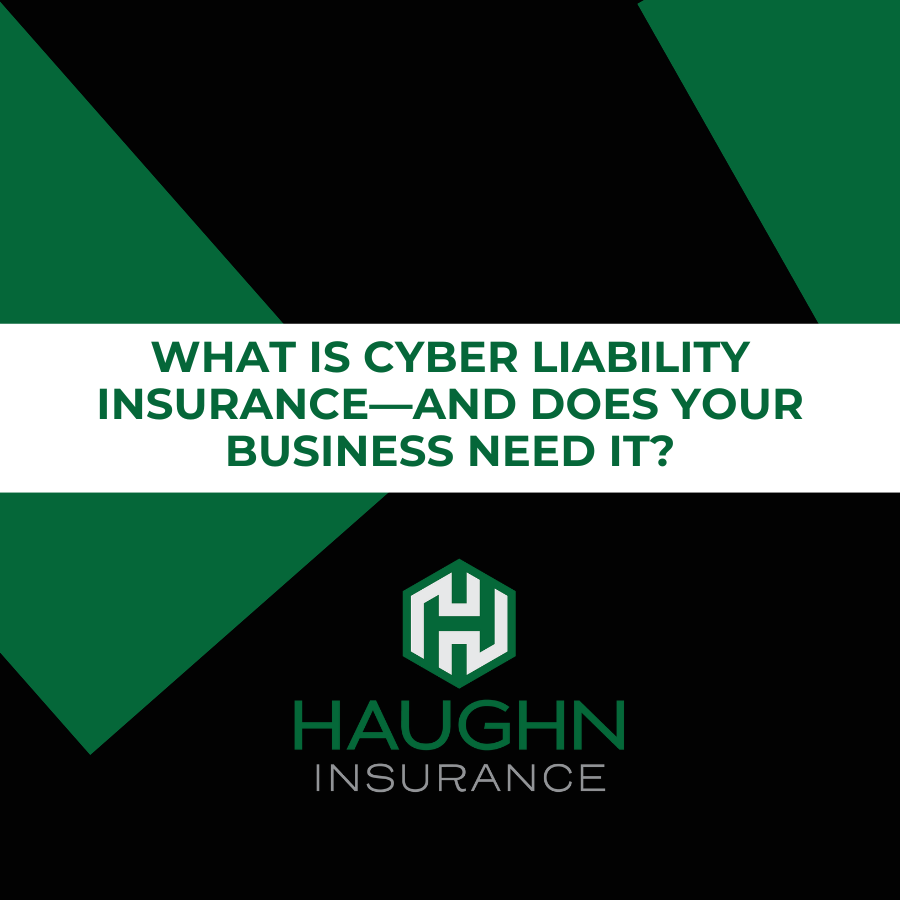
In today’s digital world, data is currency—and unfortunately, cyber criminals know it. Whether you’re a small retail shop or a large healthcare provider, if your business touches sensitive information, you’re vulnerable. Cyber liability insurance is designed to help businesses recover from the financial and reputational fallout of a cyberattack. But not all policies are created equal—and not every business knows what they’re really risking.
At Haughn Insurance, we believe in protecting our clients from the threats they can’t always see coming. Here’s what every business owner should know about cyber liability insurance.
Who Needs Cyber Liability Coverage?
If you’re asking yourself whether your business needs cyber insurance, start with these questions:
-
Do you collect, store, send, or receive personally identifiable information (PII) or personal health information (PHI)?
-
Are you in an industry that handles sensitive customer data—like education, finance, or healthcare?
-
Could your operations be disrupted by a cyberattack?
If you answered yes to any of the above, cyber liability insurance isn’t optional—it’s essential.
Not All Cyber Coverage Is Created Equal
Cyber insurance is not a one-size-fits-all product. Coverage can vary widely between carriers, and some policies may leave major exposures uncovered. That’s why working with an experienced broker—who knows how to compare policies, ask the right questions, and identify potential gaps—is critical.
We help you build the right policy for your business, not just a generic checkbox solution.
Common Types of Cyber Attacks
Cyber threats are growing more sophisticated every day. Here are some of the most common:
-
Phishing and social engineering scams
-
Ransomware and cyber extortion
-
Malware and viruses that shut down systems
-
Business email compromise (BEC)
-
Data breaches involving customer or employee information
Each attack carries a price tag. Without the right protection, your business could face lawsuits, regulatory penalties, and customer loss—all while trying to repair your systems and your reputation.
First-Party vs. Third-Party Coverage: What’s the Difference?
When shopping for cyber liability coverage, it’s important to understand two main types:
-
First-party coverage protects you—helping cover the costs to recover from a breach. This includes things like forensic investigations, data restoration, business interruption, and crisis management.
-
Third-party coverage protects you from lawsuits or claims made by others—customers, vendors, or regulators—who were affected by the breach.
A comprehensive cyber liability policy should include both.
What Can Cyber Insurance Cover?
Depending on the carrier and policy, cyber insurance can include coverage for:
-
Business interruption
-
Data breaches and network security incidents
-
Privacy liability
-
Media liability
-
Customer notification costs
-
Credit monitoring and review
-
Attorney fees and regulatory fines
-
Social engineering and phishing attacks
-
Ransomware and extortion payments
-
Rebuilding your brand reputation
-
Forensic analysis and system repair
-
Crisis management
-
Breach response costs
-
Credit protection services
-
Reward payments for identifying cyber criminals
And more. We help you sift through the fine print and choose the protections that matter to your business.
Real-Life Claim Examples
Example 1: Healthcare Clinic Ransomware Attack
A small health clinic’s system was locked by ransomware. Hackers demanded $50,000 in Bitcoin. The clinic’s cyber policy covered the ransom payment, legal counsel, patient notification, and public relations efforts—totaling nearly $125,000 in costs.
Example 2: Construction Firm Email Compromise
A construction company’s bookkeeper fell victim to a phishing scam and wired $80,000 to a fraudulent account. The cyber insurance policy covered the financial loss, forensic investigation, and additional training for staff.
How Much Could a Breach Cost?
The average cost to notify one individual affected by a data breach is $200–$400. Multiply that by the number of clients, patients, or records in your system.
100 customers = $20,000 minimum
1,000 customers = $200,000 minimum
Can your business afford that kind of unexpected hit?
What Cyber Insurance Might Not Cover
While coverage is broad, no policy is unlimited. Some cyber liability policies may not cover:
-
Prior known breaches
-
Failure to maintain security standards
-
Acts of war or terrorism
-
Physical property damage from cyberattacks
-
Insider threats or intentional misconduct
Understanding these exclusions is just as important as knowing what’s covered.
Protect What You’ve Built
Cyber threats aren’t just a big-business problem. In fact, small and mid-sized businesses are often more vulnerable because they have fewer defenses—and attackers know it. A single breach can disrupt operations, drain your finances, and damage the trust you’ve worked hard to earn.
Let us help you stay protected. At Haughn Insurance, we’ll work with you to evaluate your risk, compare carriers, and find the right cyber liability policy—so you can run your business with confidence.
Located in Dublin, Ohio. Proudly protecting businesses across Central Ohio and beyond.

